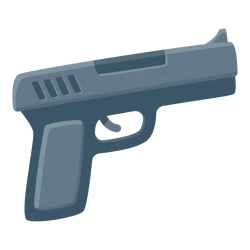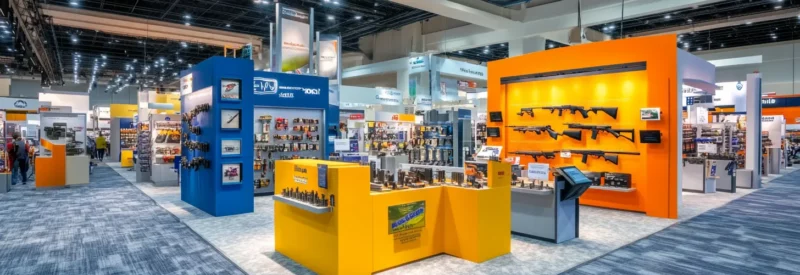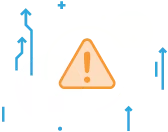TABLE OF CONTENTS
If you’re in the business of selling guns at gun shows, you will eventually come across the gun show loophole. This political reference provides insight into how gun selling works in the commercial and private sectors. As a business owner, you must know and understand these loopholes. The reality is gun sales continue to increase year over year which means a demand for business owners like yourself. Understanding what is the gun show loophole and private sale exemptions will help you keep your business in good legal standing and lead you and your customers to make safe purchasing decisions.
What is the Gun Show Loophole?
Federal law only requires background checks to be made by federally licensed gun dealers. The private sale exemption, also known as the gun show loophole, refers to gaps or ‘holes’ in certain state laws. Namely, these laws do not require private firearms sellers to run background checks on purchasers at gun shows.

What the Law Says
The Firearm Owners Protection Act of 1986 defines ‘private sellers’ of guns as those who do not sell firearms for primary income. Proponents of unregulated firearms sales at gun shows suggest the gun show loophole does not exist. They maintain gun owners, acting as private sellers, trade and sell guns at shows as they would from their homes.
FFL dealer vs. non-licensed dealer
To know the difference between an FFL dealer and a non-licensed gun dealer, you must define the two.
An FFL dealer represents a company or individual licensed by the U.S. Department of Alcohol, Tobacco, and Firearms (ATF). The Federal Firearms License (FFL) dealers receive lets them import, produce, or sell firearms and ammunition in and across specific states in the U.S. This happens through an official process called an FFL transfer.

Contrastingly, a non-licensed dealer of firearms is usually someone merely liquidating a personal gun collection. Legally, you need an FFL license if you repeatedly buy and sell guns with the purpose of making money. If you only make occasional sales from a personal gun collection, you do not need a license. This is generally where the gun show loophole is brought up in discussion.
It does not matter where you sell guns–at a show, online, or from a brick-and-mortar location–you need a license if you frequently sell firearms with the goal of making a profit. You also need a license if you auction guns consigned to you if you intend to make money from auctioning the merchandise. You do not need the license, however, if you conduct an auction and the guns remain with the estate until they are turned over to the buyer.

Determining dealer status
In the court system, judges will ask some key questions to determine whether or not you require a license to sell firearms. For example, they may ask if you’re:
- Representing yourself as a firearms dealer
- Repeatedly buying and selling guns
- Looking to make a profit
Let’s look at an example of when a seller does not need a license.
Let’s pretend you inherited a collection of guns from a relative. You would prefer to have the cash, so you post the guns online for sale. You sell the firearms in the collection in a series of transactions over time. Because the sales represent a liquidation, you do not need a license.
Now, let’s say you lose your job. To meet your expenses, you buy and sell guns and accessories online at a higher price. You’ve sold a few firearms this way in a short amount of time. You update your inventory and list even more guns for sale. In this case, you do need a license because you are repeatedly selling guns with the intention of making an income.
When do Background Checks Come Into Play?
Background checks come into play when you sell guns as an FFL dealer. Private gun sellers do not run a background check on their purchasers. This is otherwise known as a private sale exemption.

Do background checks reduce gun violence?
Lawmakers often concur background checks should be conducted, as they do help reduce problems with gun violence, unlike the gun show loophole or private sale exemption. To understand why background checks make a difference, you have to review the history behind dealer firearm checks.
The assassination of John F. Kennedy in 1963 led to the creation of the gun control legislation. Later, the Gun Control Act of 1968 came about to prevent convicted criminals from purchasing guns and protect the public. The law also prevented substance abusers, fugitives, or domestic abusers from purchasing a firearm.
In 1993, legislators passed the Brady Law after Ronald Reagan’s press secretary, Jim Brady, sustained serious injuries during an assassination attempt on Reagan. The law stipulates that anyone selling firearms has to apply and get a Federal Firearms License (FFL) to perform background checks of buyers. The Brady Act requires that FFLs run background checks on gun purchasers using the National Instant Criminal Background Check System, or NICS.
When a buyer does not pass a firearms background check
To buy a gun from an FFL dealer, applicants must fill out ATF form 4473 (Firearms Transaction Record). After completing the form, the FFL dealer checks the background of the buyer with the NICS, operated by the FBI. The background check takes less than a minute.
According to the FBI, the purchase of a firearm is prohibited if:
- The buyer was convicted of a misdemeanor with a sentence of over 2 years or was imprisoned for a crime with a sentence of 1 year or more.
- The background check reveals the buyer has an arrest warrant on file, has been a substance abuser, or was diagnosed with a mental illness.
- The buyer lives in the U.S. as an undocumented immigrant or has renounced their U.S. citizenship.
- The purchaser has been dishonorably discharged from the military or convicted of domestic violence, especially where a deadly weapon was used to threaten or suppress the victim.
As you can see, background checks can make a big difference when it comes to gun laws and public safety. Background checks help keep firearms out of the wrong hands.
Are There Other Gun-Related Loopholes?
Other gun-related loopholes exist in the form of the boyfriend loophole, the Charleston loophole, and the hate crime loophole, with the details further explained below.
The Boyfriend Loophole

As stated before, a person convicted of domestic violence against their spouse cannot legally purchase a gun. However, the boyfriend loophole allows a purchaser, who has committed domestic abuse against his partner but not his spouse, to get a gun. This stipulation applies to violence against a person the buyer is currently with but has not lived with or had children with. If these conditions are met, the law exempts them from being declined for a firearm. Certain lawmakers have tried to close this gap, but, so far, without success.

The Charleston loophole
Another legal gun-related loophole, the Charleston loophole, enables thousands of unqualified purchasers to slip through the legal system when buying guns.
Under current federal law, the FBI has three days to complete a background check on a gun purchaser. If they do not complete the check within the 3-day timeframe, a gun dealer can still sell the gun. This allows some gun purchasers to buy guns when they would otherwise be turned away.
The 2015 mass shooting that took place at the Emanuel African Methodist Episcopal (AME) Church in Charleston, South Carolina, revealed a weakness in current gun law legislation—a flaw known as the Charleston Loophole. The shooter’s criminal history would have come up in the background check and prevented him from getting a gun. However, an issue with the system caused a delay lasting more than three days. This resulted in the murderer legally purchased the gun after that period. Nine people died in the shooting.

The hate crime loophole
In some situations, people who have committed bias-type crimes, also called hate crimes, have also been able to buy guns. To show a person committed a hate crime, a prosecutor must prove, beyond a reasonable doubt, that the person committed the offense because of a person’s color, sexual orientation, race, ethnicity, or similarly prohibited reason.
Today, only seven states in the U.S. prevent people from getting a gun if they have been charged with a misdemeanor hate crime. Some perpetrators plead down their hate crime charges to a misdemeanor to maintain the right to own a firearm. Moreover, hate crimes have increased, which also increases the chances of a gun falling into the wrong hands.
Final Thoughts on the Gun Show Loophole
The gun show loophole needs to be reviewed by legislators, as it can lead to problems with gun ownership and higher rates of violence. The same can be said of other gun-related loopholes, such as the boyfriend loophole, Charleston loophole, or hate crime loophole. Until we fill these gaps or address these glitches legally, the public’s safety remains in jeopardy. As a firearms business owner, it’s important to know and understand these loopholes and private sale exemptions. This will help you provide the safest possible service to your customers.






